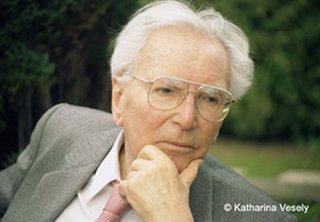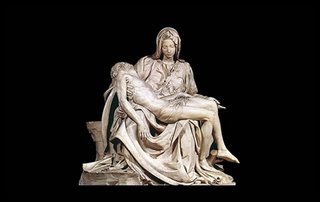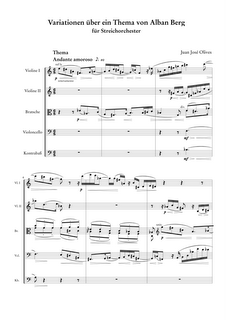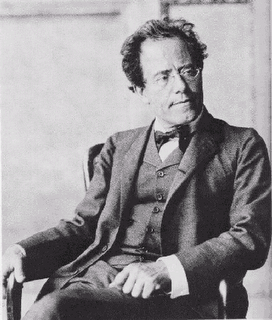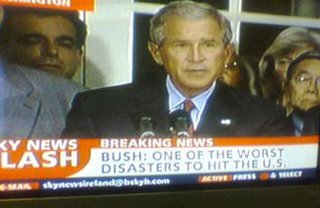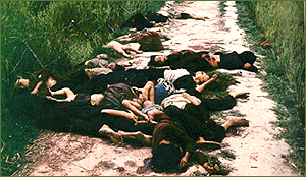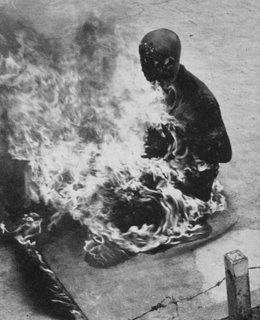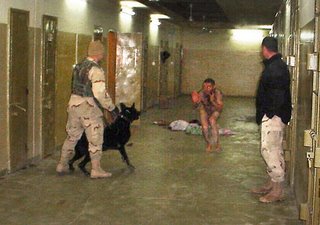
Once again we find that religion has threatened to turn our world on its ear due to the comments of a bigoted, ignorant individual, who fears the historical position of the organization that he is, by virtue of his role, the supreme leader. I am speaking of the comments made by “His Holiness”,
Pope Benedict XVI, regarding the contributions of Islam. The contentious
quotation that the Pope chose to use, for whatever reason, is a portion of text from the 14th century that detailed a dialogue between the Byzantine Emperor, Manuel Paleologus II and an educated Persian (the representative of the Muslim perspective).
The text that the Pope quoted is quite telling, in fact, without intending to, he wrote the perfect epitaph for the Roman Church that would make his predecessors blush at its frankness, and truthfulness. The Pope, in his address to a group of scholars in Regensburg said, “The emperor comes to speak of jihad, holy war. He said, and I quote: ‘Show me just what Muhammad brought that was new, and there you will find things only evil and inhuman, such as his command to spread by the sword the faith he preached.’”
Indeed, in the 14th century, what was new that Islam had contributed to the world?

The idea of “Holy War” certainly cannot be claimed as an invention of Islam. The Lord God Almighty gave the armies of the Children of Israel specific instructions as to how to defeat a superior enemy on different occasions – Jericho being the most famous. But there are examples that some would rather not have us remember, for they are not found preserved within the pages of scripture as examples of God providing succour for His people … these are examples of the excesses of despotism, of how a leader can become so corrupted with the greed of their position that they will do anything to expand their sphere of influence in order to expand their personal wealth.
To speak of spreading the faith “by the sword” has to be one of the most inconceivably ridiculous comments ever to have been issued from the Holy See since its inception. In case the Pope has forgotten, we live in what has become known as the “information age”, a time where news (both relevant and not) travels at the speed of light around the globe. It is an age of easy access to that information as well, where children can just as easily look something up as their parents can, including the deeply sordid histories of various ecclesiastical organizations.

In an age when virtually the entire world is able to access a library or bookstore, or log onto the internet and look up the word ‘
crusade’, it seems incongruous that the leader of the Roman Church would even consider making a comment about the type of violence that results from something that boils down to
fundamentalism. The truth about fundamentalism is that it is not something exclusive to Islam. Any person of any faith can become a fundamentalist: the key being that true fundamentalism isolates those involved so that they are unable to see what is going on around them for themselves: everything they see and hear is filtered by the leaders who are creating new people in their own image. Of course, this sounds like a cult because it is a cult. It is the type of cult that uses religion to preach a specific doctrine of hatred, manipulating an attitude that ultimately manipulates those who are susceptible to such manipulations, and these individuals then become the willing, devoted pawns of those who would never consider immolation for themselves, but for the “cause”, well that’s another story altogether.

By the time that Emperor Manuel Paleologus II was having his dialogue with his Persian friend, the Roman Church had already conducted over nine crusades. Nine “Holy Wars” declared by the Pope, conducted by armies that were, in some cases led by the Pope, in order to convert and subjugate the heathen peoples that hadn’t accepted – or wouldn’t accept – the gift of salvation.
Now, I don’t want to sound contentious or anything, but as someone who has spent a fair bit of time studying this matter, and as someone who has spent the past seventeen years seriously immersed in this text, I can say with more than some degree of assurance that there is not one place in the New Testament, the location of the New Covenant upon which the principle of Salvation is based, that even alludes to the use of forceful proselytising.
The facts are quite contrary to the common vision we have of the “door to door” proselytiser that sticks their foot in your door and seems to not understand what the word “no” means when you say you aren’t interested in speaking with them about their “other” testament of Jesus Christ, or about the view from the watchtower. The Gospel of Mark gives true Christians explicit instructions as to what to do when they visit someone that doesn’t want to receive their message. They were not told to force their way into the homes and make them believe. That is ridiculous. On the contrary, they were specifically told, “And whoever will not receive you nor hear you, when you depart from there, shake off the dust under your feet as a testimony against them.” (Mark 6:11, NKJV)
What does this mean? It means, quite simply, people have a choice: you can hear about the message or not, it is up to you. A minister has a responsibility to preach the word, that is part of the
Great Commission (something that all Christians share), but that responsibility does not extend to browbeating the person that has indicated that they are not interested in hearing (receiving) the message. To “shake off the dust” is a way of indicating, “I’ve done my bit”, or “I tried” – the message was offered, and rejected, it isn’t the fault of the person trying to deliver the message.
However, if a minister (or whomever) is hounding someone with the Gospel, all they are doing is making the message look like something that you wouldn’t want to be involved with, which takes me back to the early Roman Church and her predilection for spreading the faith with fear and by the edge of the sword. Not only with the edge of the sword, though, but with the red-hot branding irons and the flames of pyres that were used to burn people alive.
The Crusades were not the only way the Roman Church used its muscle to spread the message that the way to heaven was through Rome, and a pledge of fealty to His Holiness, the Bishop of Rome; the Pope. The other favoured technique in ferreting out heretics, purifying the “body of Christ”, as it were, was through the liberal use of the
Holy Inquisition.

If given the choice between conversion to Catholicism or immediate death what do they choose? In many cases there were instances of conversions that were less than “genuine”, with the people then going back to their previous practices (albeit underground and with extreme caution) while outwardly they lived as Catholics. The most famous example of this comes from the same time period that produced the document that the Pope quoted, angering so many Muslims.
In Spain and Portugal during the 12th and 13th centuries it was decided that something should be done about all the Jews and Muslims living in these “Christian” nations. So, what went wrong? When the Muslims were “offered” the message of salvation through the atonement of Jesus (and I seriously doubt they were offered the Gospel in anything even remotely relating to a calm discussion of what a belief in this amounted to) many of them chose to live double lives. In order to remain in their homes, in the homes that they had known for generations, they became the “
Morisco”, or “crypto-Muslims”: they lived outwardly as Christians, but secretly practiced their Islamic faith.
This was mirrored in the Jewish community by the term “
Marrano”, or “crypto-Jews”, who did the very same thing. The term “marrano” literally means “pigs” in Spanish and Portuguese, and is derivative of an Arabic term which means “ritually forbidden” (muharram).
Regardless of the “conversions”, both groups faced another of the Roman Church’s great historical accomplishments: the Inquisition.
The crusaders often didn’t even give that option, opting instead to send the infidel directly to God’s judgement, and yet the Inquisitors seemed to kill with even more vigour. History’s most remembered of the Church’s henchmen must be
Tomas de Torquemada who is credited with anywhere from 13,000 – 50,000 deaths. He particularly enjoyed persecuting the Jews and Muslims who had converted, testing their conversions … such tests usually resulting in death regardless of the outcome.
This is only a tiny portion of the history of the institution that claimed to be founded upon the man who is called “Love”. This is only a small part of the history of the abuse of power by the dominant power in the world. It is the precursor to the state-sponsored terrorism we see today when the United States manipulates the news in order to validate a war against a nation that had nothing to do with an attack against their land. By creating an atmosphere of fear and promoting an attitude of ignorance amongst the average individual the Church was enabled to carry on with their private agenda for over one thousand years with virtually no objections.
Ah yes, that epitaph I promised:
Without conscience there can be no objection.So how do the words of a Pope in 2006 have anything to do with the actions of some questionable individuals nearly one thousand years ago, and then those who took part in the inquisition? Quite simply because of what he demands through his position: as the Pope, Benedict XVI is the creator of Canon Law. He is the only person that is enabled to change “doctrine” in the Roman Church.
As an example I shall offer this: we know through various historical sources that the last of the New Testament texts was written within the generation after the death of Jesus. The entire
texus receptus of the New Testament is available in manuscripts dating from 250 years after the date of its completion (compared to 1,000 years or more for copies of some great masterpieces of antiquity). In none of the copies of the New Testament that have been published has there ever been a verse stating that Mary, the mother of Jesus, did not die a physical death and was taken up into heaven corporally (as Elijah the prophet was, and Jesus, after the resurrection).
In 1950, after the Roman Church had been believing this non-scriptural abomination of twisting the Pagan Roman traditions involving the fertility goddess (which also brought us Christmas on December 25th, which has nothing to do with the birth of Jesus), Pope Pius XII declared:
“the Immaculate Mother of God, the ever Virgin Mary, having completed the course of her earthly life, was assumed body and soul into heavenly glory.”
This was published in the encyclical
“Munificentissimus Deus” and carries a warning to those who may reject this non-scriptural declaration:
45. Hence if anyone, which God forbid, should dare wilfully (sic) to deny or to call into doubt that which we have defined, let him know that he has fallen away completely from the divine and Catholic Faith. [46 snipped: not relevant]
47. It is forbidden to any man to change this, our declaration, pronouncement, and definition or, by rash attempt, to oppose and counter it. If any man should presume to make such an attempt, let him know that he will incur the wrath of Almighty God and of the Blessed Apostles Peter and Paul.
Christianity had survived without the doctrine of the Assumption of Mary since the death and resurrection of Jesus, the person that, theoretically, is the foundation of this faith. But with the act of the Pope, Mary has risen into heaven without having experienced a physical death … and yet there isn’t a single account of this in any book anywhere.
So, the Pope declares it, and it is so. This is called Papal infallibility, particularly in regards to issues regarding dogma. As the successor, through the precepts of the unbroken succession of the Papacy from Peter, the supposed first Pope, to Benedict XVI, there is the belief that the spiritual continuity of the position remains intact. In other words, since they believe that the Holy Spirit guides the College of Cardinals in their selection of the Holy Father, one must imagine that the Holy Spirit would also confer unto the new “Rock upon which I shall build my church” the complete essence that every pontiff represents.
Of course, Benedict XVI could just be a man, a former German priest, former member of the Hitler youth, former guardian of the Papal doctrine under John Paul II … former … guardian of doctrine? Oh yes, while John Paul II was Pope then Cardinal Ratzinger was the one charged with making sure nothing left the Papal offices that was in conflict with official church doctrine, serving as the
Prefect of the Congregation for the Doctrine of the Faith. He was also one of the consulting theologians of the
Second Vatican Council before he was appointed the Archbishop of Munich and Freising.
Does a man of such obvious learning make “simple” mistakes when it comes to a discussion about the thing that matters most to his life? I think not. There can be no doubt that the Pope clearly understood that his comments would serve to enrage those individuals that it was clearly aimed at, yet at the same time, it casts a dark shadow at the speaker and the organization he represents.
If we allow ourselves to doubt that Pope Benedict XVI misspoke or said something out of context we are fools. This is not a dowdy old man who is fumbling around for words while those around him smile politely while people make polite jokes about the “Holy Father needing a nap.” As the Prefect of the Congregation for the Doctrine of the Faith it was Cardinal Ratzinger’s job to keep the Roman Church on course when it came to theological issues. People wondered why the liberal-minded John Paul II didn’t ever take the step to allow women to be ordained? One word: Ratzinger.
Ratzinger … Benedict XVI writes his own speeches, and he is not likely to have mistaken the context of a discussion between a Christian Byzantine emperor and a Persian. At the same time, for one who should be as familiar with the Bible as he is, I am amazed that he would include that reference knowing the unfortunate history of the Church after one very prophetic comment by Jesus which was spoken when he was betrayed and the soldiers came to arrest him in the garden.
As they laid hand on Jesus to arrest him, Peter took out his sword and struck one of them. Jesus rebuked him and said, “Put your sword in its place, for all who take the sword will perish by the sword.” (Matthew 26:52, cf. Jn. 18:10, NKJV)
The only possible thing that Pope Benedict XVI could have wanted to accomplish with his comments is to once again prove that the Roman Church continues to live according to its primary foundation: avoid the love and light offered by Christ at every opportunity in favour of your own devices. Base your church on what you have conceived in your image, build it, and see that it is good, and it shall be, even if it is an abomination unto the Lord, for your ways and his ways are as different as the day is to night.
I am not going to answer the question, “what has Islam given us”, for I am not a Muslim, nor do I pretend to be an apologist for Islam. There are more than enough intelligent, articulate and well-informed individuals who are quite capable of doing this without my assistance (though I would invite them to post their comments here if they so desire).
As for Christianity, my position is simple: going to church doth not a Christian make. One is not “born” into the church. Christianity is NOT a religion. If any of that makes sense, and you are saying, “amen” to yourself, you know what I mean, and understand the idea of “relationship” and “fulfilment”. I do not post often about religion here, mostly because I am anti-religion – I believe religion interferes with our ability to have a relationship with God.
My beliefs are not compatible with those of certain faiths, but do not foist my beliefs upon those around me either. Another man I admire lived like that … his name was Yeshua (some would call him Jesus). Today he’d hang out in bars and coffee shops.
Tags:
Crusades, Cults, God, Islam, Jesus, Pope Benedict XVI, Pope, Religion, Salvation, Vatican, War





